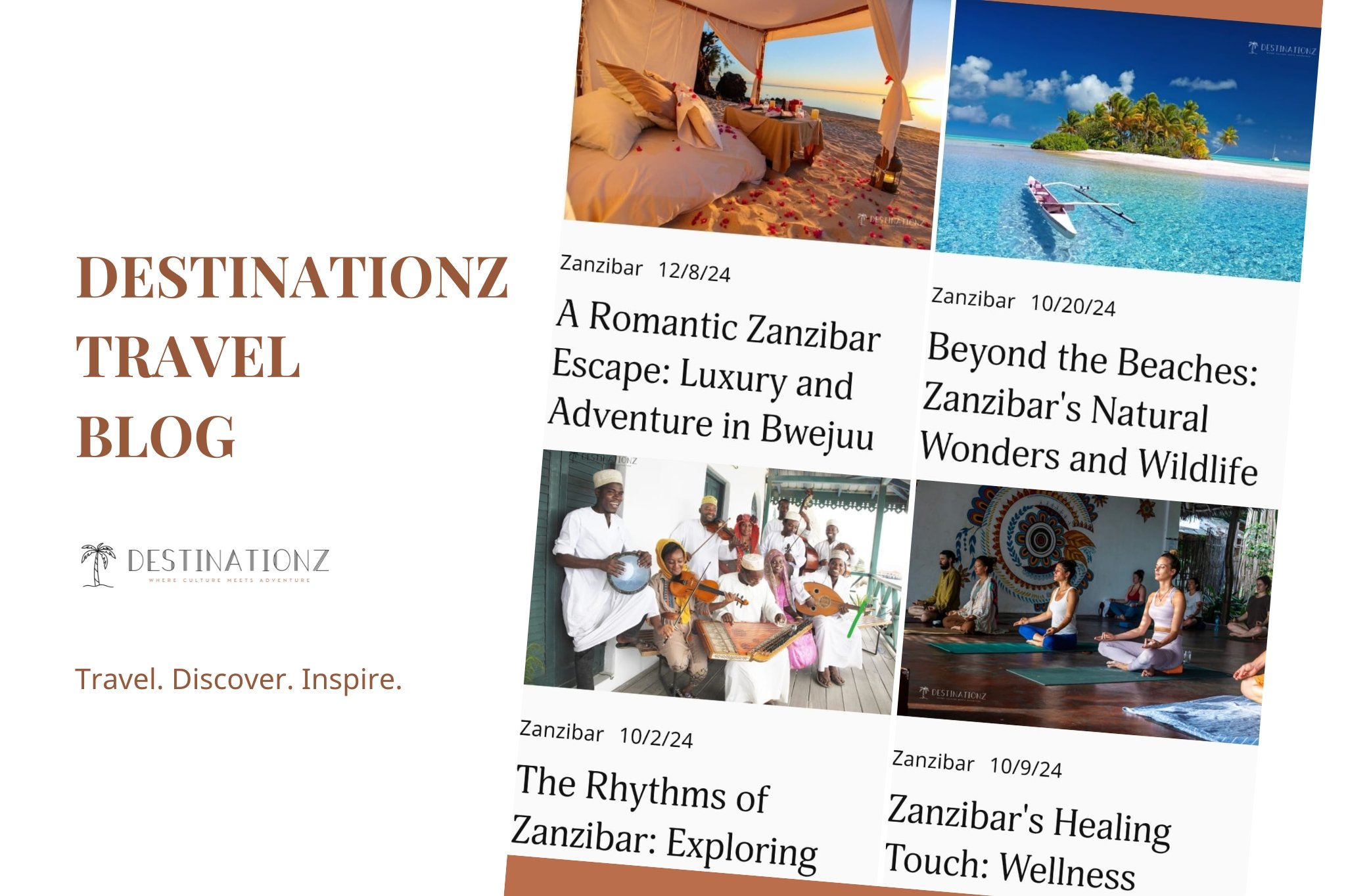Dhow Sailing in Zanzibar: A Traditional Experience
Hey, fam! It's Leonie and Jasmine, your Zanzibar explorers from Destinationz, ready to take you on a journey back in time aboard one of the most iconic symbols of the Swahili coast: the dhow.
A Legacy of the Sea: The History of Dhows in Zanzibar
For centuries, these graceful wooden sailing vessels have plied the waters of the Western Indian Ocean, connecting Zanzibar with the Arabian Peninsula, India, and beyond. More than just a means of transport, dhows were (and still are) vital to trade, fishing, and the very fabric of life on the island. They are a prominent feature in the history of Zanzibarand along the East African coast. Traditionally they were powered by the lateen sail which was used to harness the power of the monsoon winds.
The Craft of Dhow Building:
Traditionally, dhows are built by hand, using techniques passed down through generations. Skilled craftsmen meticulously shape planks of wood, often without the use of modern tools, to create these sturdy and elegant vessels. It's a testament to the ingenuity and craftsmanship of Zanzibari boat builders. It is believed that this tradition goes as far back as the 8th Century. These days many are equipped with an outboard engine but many can still be seen using their sail.
Types of Dhows:
While the term "dhow" is often used as a general term, there are actually several different types of dhows, each with its own unique design and purpose. Some common types you might encounter in Zanzibar include:
The Jahazi: A large dhow traditionally used for long-distance trade.
The Boom: Another large dhow known for its distinctive pointed bow.
The Mtepe: An ancient type of sewn dhow with a unique flexible hull.
The Ngalawa: A smaller, more agile dhow commonly used for fishing and shorter trips. It has outriggers on each side.
Experiencing Dhow Sailing in Zanzibar Today:
Today, dhows continue to play a role in Zanzibari life, but they're also a popular way for visitors to experience the beauty and magic of the island from a unique perspective. Many also offer private experiences for you and your family or friends.
Sunset Dhow Cruises: A Must-Do Experience
One of the most popular dhow experiences is the sunset cruise. As the sun dips below the horizon, painting the sky in a kaleidoscope of colors, you'll sail along the coast, enjoying breathtaking views of Stone Town or the coastline of the island. Many sunset cruises include drinks, snacks, and even live music, creating an unforgettable evening on the water. You can even go swimming at some locations.
Other Dhow Adventures:
Beyond sunset cruises, there are many other ways to experience traditional dhow sailing in Zanzibar:
Snorkeling and Diving Trips: Many dhows are used to take visitors to prime snorkeling and diving locations, such as the Mnemba Atoll. They often have life jackets on board in case of emergency.
Island Hopping: Explore nearby islands, like Prison Island or Chumbe Island, on a traditional dhow.
Fishing Trips: Try your hand at traditional fishing techniques from a dhow.
Day Trips to Beaches: Enjoy a relaxing day trip to a secluded beach, complete with a delicious Swahili lunch.
Choosing a Dhow Cruise Operator:
When choosing a dhow cruise operator, it's important to select a reputable company that prioritizes safety and sustainability. Look for operators that:
Have well-maintained dhows and experienced crew.
Follow responsible tourism practices.
Offer authentic cultural experiences.
Have positive reviews from other travelers.
Have life jackets on board.
Dhow Sailing: A Connection to Zanzibar's Soul
Stepping aboard a traditional dhow is like stepping back in time. It's a chance to connect with Zanzibar's maritime heritage, experience the beauty of the Indian Ocean, and create memories that will last a lifetime. It offers a unique perspective of the coast of Zanzibar and East Africa. Before you set sail you can even explore the boat and its deck. You can even speak to the crew and captain who will usually steer the boat with a tiller. Depending on the weather you may even be able to sail without the use of a motor.
Destinationz: Your Guide to Authentic Zanzibar Experiences
At Destinationz, we're passionate about helping you discover the soul of Zanzibar. Whether it's sailing on a traditional dhow, exploring the spice farms, or getting lost in the maze-like streets of Stone Town, we'll create a personalized itinerary that's perfect for you. We can even help you book a trip on a dhow with a reputable operator in Tanzania.
Book your free consultation call with us today, and let's start planning your unforgettable journey to Zanzibar! We can even help you plan which sites to visit and which hotels to stay at.
Check out our existing travel packages: [Zanzibar Travel Packages]
Uncover the Secrets of Zanzibar - Explore Our Blogs:
-
Zanzibar Vibes: Connecting with Culture & History on the Spice Island
Beyond the Beaches: Zanzibar's Natural Wonders and Wildlife Encounters
Luxury in Paradise: Indulge in Zanzibar's Finest Resorts and Experiences
The Spice Island's Soulful Cuisine: A Culinary Journey Through Zanzibar's Flavors
Stone Town Stories: Unveiling the Secrets of Zanzibar's Historic Heart
The Rhythms of Zanzibar: Exploring Music, Dance, and Artistic Traditions
Zanzibar for Families: Creating Memories that Last a Lifetime














